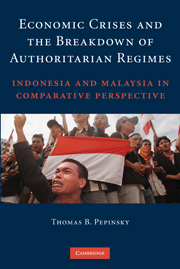 Economic Crises and the Breakdown of Authoritarian Regimes
Economic Crises and the Breakdown of Authoritarian Regimes Published online by Cambridge University Press: 21 January 2010
Soeharto resigned from the office of president of Indonesia on May 21, 1998, some ten months after the onset of currency speculation against the rupiah. His resignation signaled the end of the New Order regime and the beginning of a period of transition toward democracy. His successor, B. J. Habibie, who had been serving as vice president, was an aeronautical engineer known more for his nationalist economic ideology and loyalty to Soeharto than for any independent political skill. By the end of 1999, Abdurrahman Wahid (Gus Dur) assumed the country's presidency, and Indonesia's transition to democracy was complete. One of the world's most enduring dictatorships became the world's third most populous democracy.
Yet a firm understanding of why the New Order collapsed as it did, when it did, remains elusive. The theory advanced in Chapter 2 shows how political conflict over adjustment policy drove the breakdown of the New Order. The New Order collapsed because mobile capital – in the Indonesian context, ethnic Chinese konglomerat – withdrew its support from the regime. This fracture in the New Order's support coalition took place gradually, during the first six months of 1998, during which time Indonesia saw a dramatic upsurge in anti-Chinese violence. It culminated in anti-Chinese riots during May 13–14, 1998, which drove most of the konglomerat overseas. Many factional alignments existed in Indonesia along which the regime might have fractured: capital (mobile and fixed) versus labor, or Muslim versus non-Muslim, or even political Islam (“green”) versus secular nationalism (“red and white”).
To save this book to your Kindle, first ensure no-reply@cambridge.org is added to your Approved Personal Document E-mail List under your Personal Document Settings on the Manage Your Content and Devices page of your Amazon account. Then enter the ‘name’ part of your Kindle email address below. Find out more about saving to your Kindle.
Note you can select to save to either the @free.kindle.com or @kindle.com variations. ‘@free.kindle.com’ emails are free but can only be saved to your device when it is connected to wi-fi. ‘@kindle.com’ emails can be delivered even when you are not connected to wi-fi, but note that service fees apply.
Find out more about the Kindle Personal Document Service.
To save content items to your account, please confirm that you agree to abide by our usage policies. If this is the first time you use this feature, you will be asked to authorise Cambridge Core to connect with your account. Find out more about saving content to Dropbox.
To save content items to your account, please confirm that you agree to abide by our usage policies. If this is the first time you use this feature, you will be asked to authorise Cambridge Core to connect with your account. Find out more about saving content to Google Drive.